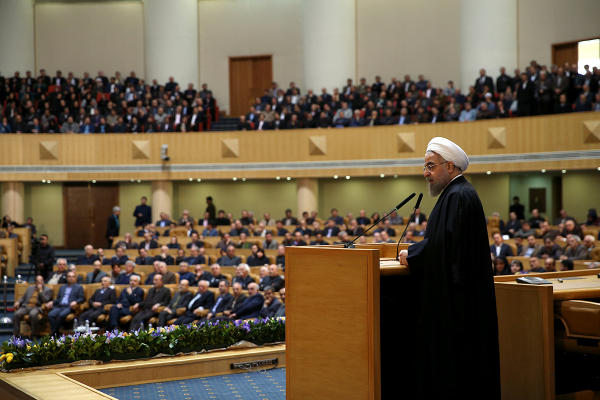The world observes Iran in search of any signs of change; to change from being a rogue and revolutionary state to being a respectable member of the international community. Instead of addressing the isolation it experienced, Iran resorted to obscuring its sectarian policies and dangerous expansionism. In addition to this, it supported terrorism by making accusations against the Kingdom of Saudi Arabia without evidence to support these accusations.
It is important to understand the reasons that prompted the Kingdom of Saudi Arabia and its allies in the form of Gulf countries to resist Iranian expansion and respond strongly to any aggressive moves by Iran. On the surface, it may seem as though there is change in Iran as we are aware of the initial steps taken by Iran regarding its agreement to halt its nuclear program to develop a nuclear weapon. We are also completely sure that a large segment of the Iranian people are seeking to achieve greater opening up at a domestic level and the formation of better relationships with neighbouring countries and the world. However, the Iranian government doesn’t want that.
Iran’s approach has been constant since its revolution in 1979 when its constitution stipulated the export of this revolution, and it relied on the support of extremist and violent groups including Hezbollah in Lebanon, the Houthis in Yemen and sectarian militias in Iraq. Likewise, Iran or its agents are accused of carrying out terrorist attacks across the globe including the bombings that targeted the US Marine barracks in Lebanon in 1983, the Khobar Towers in Saudi Arabia in 1996 and the assassinations carried out at the Mykonos restaurant in Berlin in 1992. Some estimates indicate that Iranian-backed forces have killed more than 1,100 US troops in Iraq since 2003.
In addition to this, Iran resorted to targeting diplomatic sites to use that as one of its foreign policy tools. Iran did not storm the American embassy and take control of it in 1979 until the beginning of this method, and since then, the British, Danish, Kuwaiti, French, Russian and Saudi embassies have been attacked, whether that be in Iran or abroad at the hands of its agents just as foreign diplomats and local political activists have been subject to assassination all over the world.
Hezbollah, an Iranian agent in Lebanon also seeks to control Lebanon and wage war against the Syrian opposition. In doing so, it helps ISIS to prosper and this explains the reason that drives Iran to keep Bashar Al-Assad in power. The US State Department report on terrorism issued in 2014 mentioned that Iran sees in Syria an “important way to supply Hezbollah with arms” – Iran would provide weapons, financial support and training in order to “support the Assad regime’s savage repression which has claimed no less than 191,000 people”. The same report issued in 2012 mentioned that there is “clear re-establishment of funding for terrorism from Iran” which was shown by an increase in Hezbollah’s terrorist activity that reached a level not seen since the nineties.
A product of Iran’s support for the Houthi coup against the legitimate government in Yemen is the outbreak of war that has claimed the lives of thousands. While Iran claims that its foreign policies focus on building friendship, we find that its approach shows that the opposite is true. Iran is the most hostile country in the region and its reactions reflect its commitment to controlling the region and its deep-rooted conviction that any goodwill gesture is a sign of weakness whether that is the weakness of Iran or its opponents.
Iran carried out ballistic missile tests on the 10th of October i.e. within a few months of signing the nuclear agreement and this is considered a violation of the United Nations Security Council’s resolutions. In December, an Iranian military ship fired rockets near a US ship and a French frigate crossing international waters. In addition to this, since the signing of the nuclear deal Iranian Supreme Leader Ayatollah Ali Khamenei has defended the Iranian slogan “Death to America”.
Saudi Arabia will not allow Iran to meddle with our security or the security of our allies and will confront all attempts that seek to meddle with it and threaten it.
Iran has also insulted and offended all Saudis by saying that my country is brainwashing people and spreading extremism. We are not described as state sponsors of terrorism, Iran is. We do not have a client sentenced in the New York federal court to 25 years for his involvement in the assassination of the ambassador in Washington in 2011, Iran does.
Saudi Arabia has been a victim of terrorism and operations carried out mostly by Iran’s allies. Our country is the first line of defence to fight terrorism and is working to confront it by working closely with our allies. The Kingdom of Saudi Arabia arrested thousands of those involved in terrorist operations and executed hundreds of them. We continue to fight terrorism and the Kingdom leads the efforts of numerous countries to prosecute anyone involved in terrorist activities, funding them and the adoption of the ideology that incites terrorism.
However, the real question is whether Iran wants to work according to the laws of international regulations or to remain a revolutionary state that seeks to expand and disregard international law. In the end, we want Iran to work to solve these problems so that nations can live in peace. Achieving this will require major changes in Iran’s policy and approach, and this is something that we are still waiting for.
